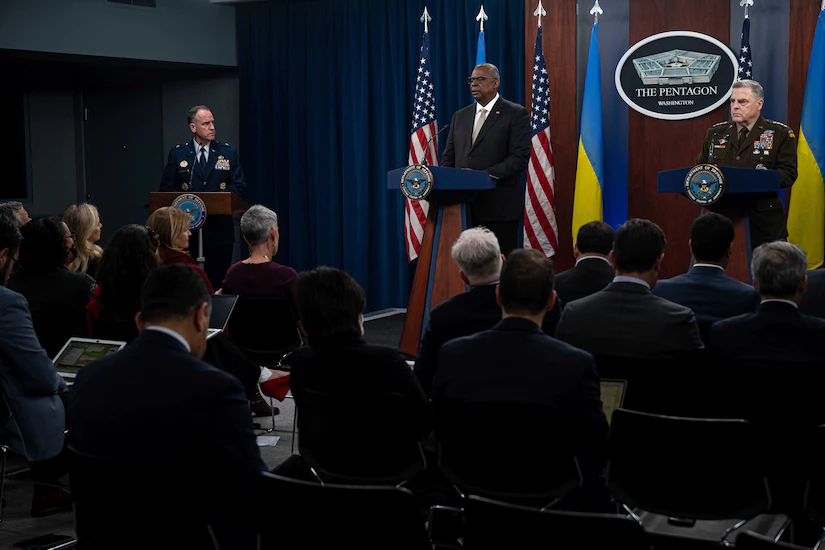Arlington, VA…The unity of the Ukraine Defense Contact Group is solid and the group is making great strides in getting the Ukraine military the capabilities it needs to defend the country, Secretary of Defense Lloyd J. Austin III said at the Pentagon today.
Secretary of Defense Lloyd J. Austin III and Chairman of the Joint Chiefs of Staff U.S. Army Gen. Mark A. Milley stand at a podium in front of reporters.
Austin and Army Gen. Mark Milley, the chairman of the Joint Chiefs of Staff, met virtually from the Pentagon with representatives from more than 50 countries and organizations. It was the seventh meeting of the group. “It’s been another highly successful session,” Austin said during a news conference after the meeting. “Now, we were meeting today as Russia continues to target Ukraine civilians and bombard its energy grid. But Russia’s deliberate cruelty only deepens our resolve and will continue to support Ukraine’s bedrock right to defend itself and defend the rules based international order.”
Austin addressed the deadly explosion in Poland near its border with Ukraine. He spoke with his Polish counterpart underscoring America’s ironclad commitment to defend Poland. “We have full confidence in the Polish government’s investigation of this explosion,” he said. “They’ve been conducting that investigation in a professional and deliberate manner, and we won’t get ahead of their work.”
Austin said he will stay in touch with Polish officials and NATO allies and partners. “We’re still gathering information, but we have seen nothing that contradicts [Polish] President [Andrzej] Dudas preliminary assessment that this explosion was most likely the result of a Ukrainian air defense missile that unfortunately landed in Poland,” he said. “And whatever the final conclusions may be, the world knows that Russia bears ultimate responsibility for this incident.”
Spotlight: NATO
Everyone in the contact group agrees that Ukraine “has a bedrock right to defend itself, and we will continue to stand in solidarity with the people of Ukraine,” Austin said.
Ukrainian Defense Minister Oleksii Reznikov joined the meeting and updated the group on the current battlefield dynamics and on Ukraine’s most urgent self-defense needs. “Ukraine’s troops continue to consolidate their gains on the battlefield as they head into the winter. And the contact group continues to bolster Ukraine’s air defenses in the face of Russia’s on-going barrages.
“I’m pleased to be able to report that the [National Advanced Surface-to-Air Missile Systems] air defense systems that we’ve sent to Ukraine are now operational,” Austin said. “Their performance, so far, has been very impressive. The NASAMS systems had a 100 percent success rate and intercepting Russian missiles.”
The contact group also discussed training for the Ukrainian military. “I’m confident that the training efforts spearheaded by the United States and many other members of this contact group will equip the Ukrainian armed forces with the skills that they need to consolidate their gains and to seize new opportunities on the battlefield,” Austin said. “I’d also like to acknowledge the European Union’s important efforts here. The EU’s training program across Europe will do a great deal to reinforce what other countries are doing bilaterally.”
He noted the United Kingdom pledged to train another 19,000 Ukrainian troops next year.
Other countries stepped up, as well, including Sweden with a $287 million package of assistance to Ukraine. Spain has promised to send more Hawk missile batteries and missiles. Canada has pledged $500 million in assistance including winter gear.
Austin said each meeting of the contact group has yielded tangible results.
When Russian President Vladimir Putin launched his war of choice, “they embarked on a tremendous strategic mistake,” Milley said in his remarks. “They made a choice in February of this year to illegally invade a country that posed no threat to Russia. In making that choice, Russia established several objectives. They wanted to overthrow [Ukrainian] President [Volodymyr] Zelenskyy and his government.”
Russia wanted to secure access to the Black Sea, and capture the seaport of Odessa. Russia wanted to seize all the way to the Dnieper River, then pause and then continue to attack all the way to the Carpathian Mountains. “In short, they wanted to overrun all of Ukraine,” the chairman said. “And they lost. They didn’t achieve those objectives. They failed to achieve their strategic objectives, and they are now failing to achieve their operational and tactical objectives.”



